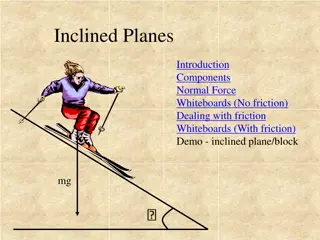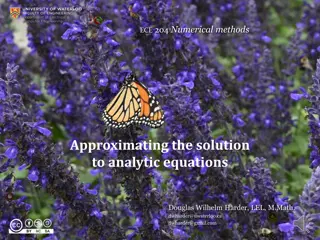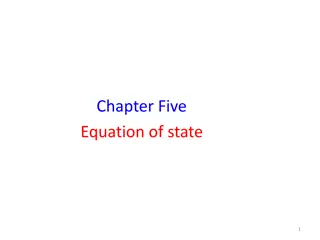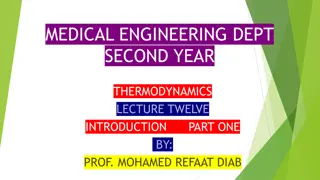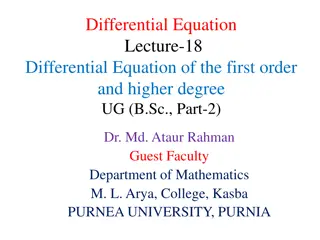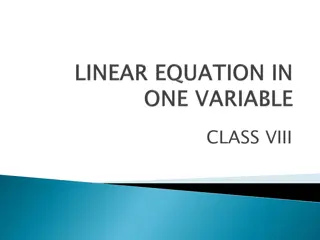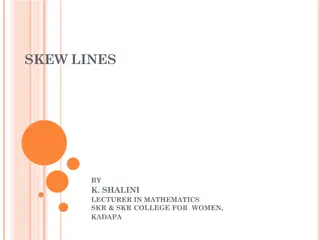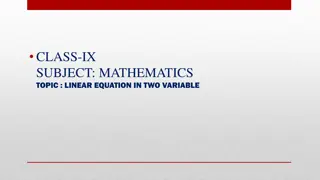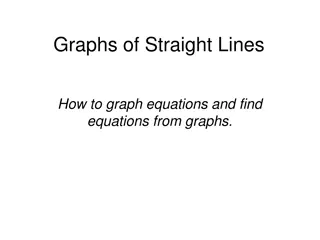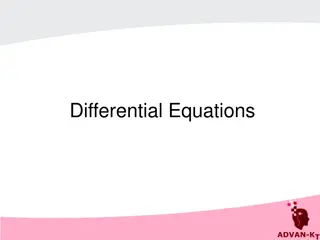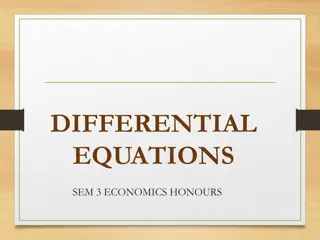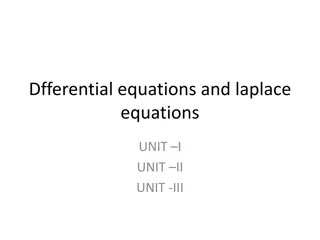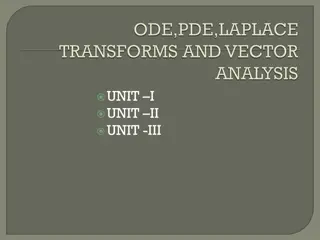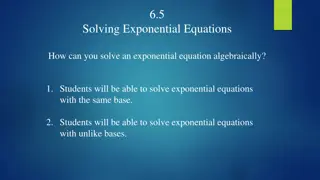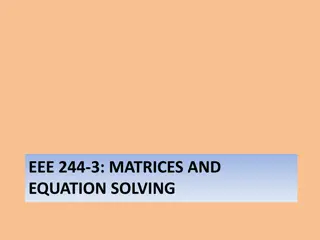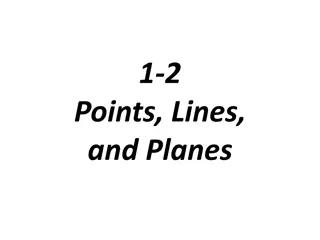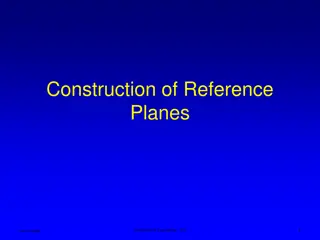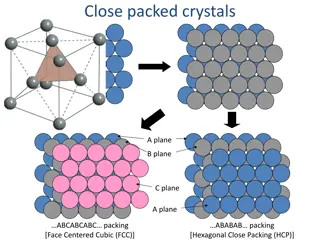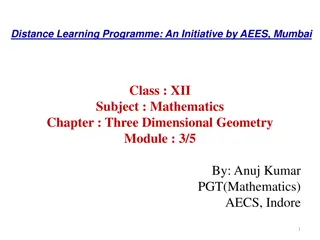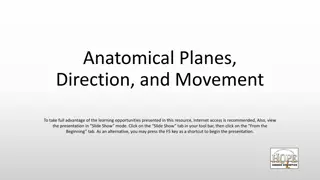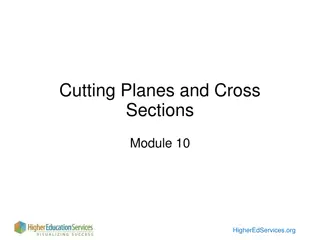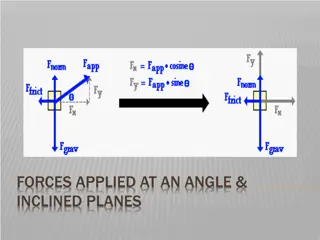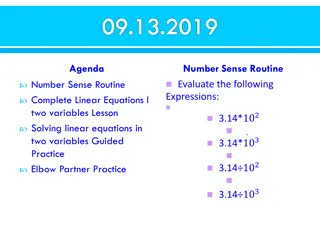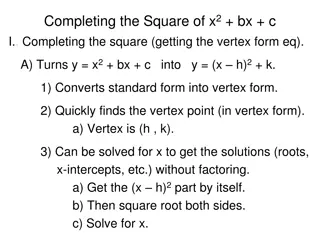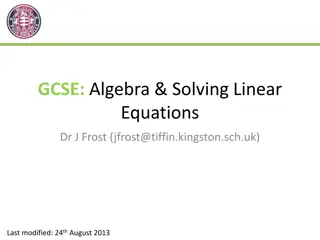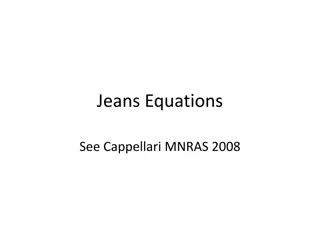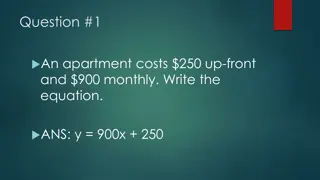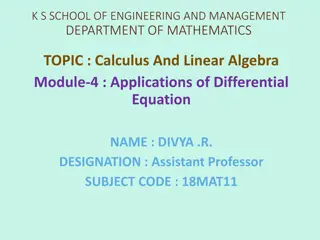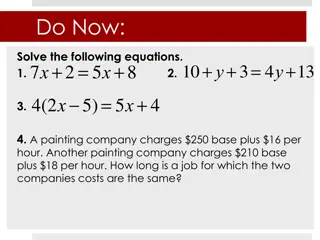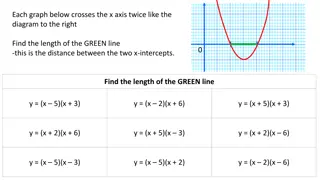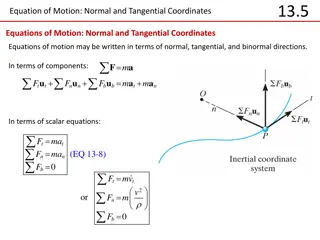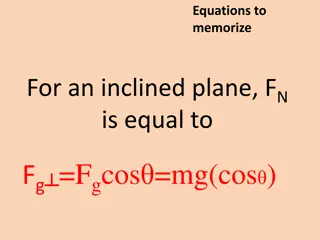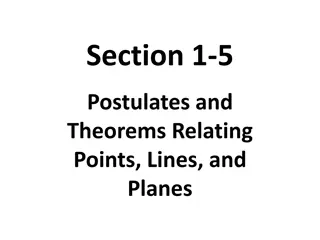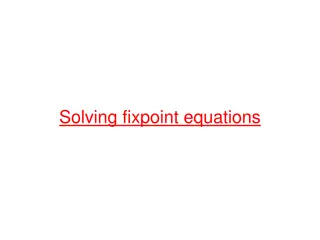Understanding Chemical Reactions: Reactants, Products, and Balancing Equations
Chemical reactions involve reactants that transform into products. Balancing equations is essential to ensure the conservation of mass. Learn about decomposition reactions, chemical equations, and methods to balance equations effectively.
4 views • 39 slides
Understanding Inclined Planes and Friction Forces
Introduction to inclined planes, components of forces, dealing with friction on whiteboards, and demonstrations on block forces on inclined planes. Learn about calculating components of gravity, friction forces, and scenarios involving kinetic and static friction on an inclined plane.
3 views • 11 slides
Understanding Numerical Methods for Approximating Analytic Equations
Introduction to approximating solutions to analytic equations, focusing on differential equations, integral equations, and integro-differential equations. Exploring ordinary and partial derivatives, differential and integral equations, and the involvement of unknown functions and their derivatives a
2 views • 15 slides
Equations of State in Thermodynamics
In the study of thermodynamics, equations of state play a crucial role in predicting the behavior of substances based on pressure, volume, and temperature relationships. These equations define the interdependence of various intensive properties for a simple compressible substance. The development an
0 views • 42 slides
Understanding Maxwell Equations in Thermodynamics
In thermodynamics, Maxwell equations are derived using Euler's reciprocity relation. They involve characteristic functions such as internal energy, free energy, enthalpy, and Gibbs free energy, along with parameters like temperature, entropy, pressure, and volume. These equations form the foundation
0 views • 15 slides
Differential Equations of First Order & Higher Degree: Lecture 18
This lecture covers differential equations of first order but not of the first degree, general forms of such equations, methods for solving them, and examples of differential equations to be solved. The content includes detailed explanations, equations, solutions, and problem-solving techniques.
0 views • 9 slides
Understanding Linear Equations in Algebra: A Comprehensive Overview
An exploration of algebraic expressions, equations, and linear equations in one variable with detailed explanations and examples. Discover the fundamental concepts, solving methods, and applications of linear equations in various word problems. Master the art of transforming mathematical expressions
0 views • 15 slides
Linear Equations Checkpoint Activities for Year 8 Students
This diagnostic mathematics resource for Year 8 students focuses on solving linear equations through a series of Checkpoint and additional activities. Published in 2021/22, the content covers topics such as representing equations with algebra and solving for unknown variables. Students will engage w
0 views • 47 slides
Understanding Skew Lines and Planes in 3D Geometry
Explore the concepts of skew lines, parallel lines, perpendicular lines, and planes in 3D geometry through real-life examples and equations. Learn about the shortest distance between skew lines and solve problems related to their applications.
1 views • 46 slides
Learning Linear Equations in Two Variables
Understanding linear equations in two variables is essential for solving real-life problems. This topic covers the definition, solution, and graphical representation of such equations, helping students connect mathematical concepts to practical scenarios. By learning to write and solve linear equati
3 views • 31 slides
Understanding Graphs of Straight Lines and Equations
Learn how to graph equations and find equations from graphs of straight lines. Explore tables of values, plotting points on a coordinate plane, drawing lines through points, and identifying relationships between graphs and algebraic expressions. Discover the gradient-intercept form of a straight lin
0 views • 14 slides
Understanding Differential Equations: Types, Classification, and Solutions
Differential equations are mathematical equations that relate independent and dependent variables through differential coefficients. They can be classified as ordinary or partial, based on the types of derivatives involved. The order and degree of a differential equation, as well as its linearity an
3 views • 26 slides
Understanding Differential Equations in Economics Honours
Differential equations, introduced by Newton and Leibniz in the 17th century, play a key role in economics. These equations involve derivatives and represent implicit functional relationships between variables and their differentials, often related to time functions. The order and degree of a differ
1 views • 16 slides
Introduction to Differential Equations and Laplace Equations
Understanding differential equations of various orders, solving methods, linear and non-linear equations, ordinary and partial differential equations, definitions of solutions, and general vs. particular solutions in the context of Differential Equations and Laplace Equations.
1 views • 20 slides
Understanding Differential Equations: Basics to Applications
Differential equations are fundamental in mathematics, with various types such as first-order, partial, and Clairaut's equations explored in this content. The content covers general equations, solutions, and examples, providing insights into linear and higher-order equations with constant coefficien
0 views • 20 slides
Understanding Partial Differential Equations of Second Order
Exploring the concepts of second-order partial differential equations in mathematics, including the general form, linear equations with variable coefficients, and equations with constant coefficients. Learn about integral solutions, examples, and techniques for solving these equations with detailed
0 views • 21 slides
Solving Exponential Equations Algebraically
Learn how to solve exponential equations algebraically with the same base and unlike bases. Understand the properties of equality for exponential equations and practice solving various equations step by step. Improve your skills in rewriting equations with the same base and applying the rules of exp
0 views • 9 slides
Understanding Matrices and Solving Equations in Electrical Engineering
Matrices play a crucial role in solving linear equations in Electrical Engineering applications. Learn about matrix structures, special matrices, inverses, transposes, system of linear equations, and solving methods using MATLAB/Python. Explore the application of matrices in solving voltage-current
1 views • 24 slides
Understanding Points, Lines, and Planes in Geometry
Explore the fundamental concepts of points, lines, and planes in geometry. Learn how to name them, identify collinear points and coplanar elements, understand segments and rays, and delve into the intersections of planes through postulates. Enhance your geometric knowledge with clear definitions, di
0 views • 19 slides
Introduction to Construction of Reference Planes in Engineering
Explore the process of constructing reference planes in engineering, including principal planes, creating reference planes, reference features, and how to uniquely define a plane. Reference planes are essential for creating new sketches and carrying out feature operations in engineering design.
0 views • 12 slides
Understanding Crystal Lattice Planes and Indices
Exploring the significance of crystal lattice planes in determining parameters, diffraction methods, and orthogonal systems. Discover how to identify planes and calculate distances in various lattices using Miller indices. Visual aids provide clarity on hexagonal structures and symmetry in crystallo
0 views • 22 slides
Understanding Equations of Planes in Three-Dimensional Geometry
In this module, we delve into the concept of planes in three-dimensional geometry. Starting with the definition of a plane and its general equation, we explore intercept form, normal form, and practical examples. Equations, concepts, and applications are explained methodically to enhance understandi
0 views • 11 slides
Understanding Plane Surfaces in Engineering Drawings
Exploring the concept of plane surfaces in technical drawings, this informative content covers the definition, characteristics, and positioning of planes in space relative to projection planes. It also delves into the projections of various plane surfaces parallel, perpendicular, and inclined to pri
0 views • 9 slides
Understanding Inclined Planes: Simple Machines that Make Work Easier
Inclined planes are simple machines that help move heavy objects up a certain height by spreading out the force needed to move them. By creating a ramp where one side is higher than the other, objects can be moved up or down with less effort. Examples of inclined planes in daily life include ramps,
0 views • 13 slides
Understanding Anatomical Planes, Directions, and Movement in Human Body
Explore the fundamentals of anatomical planes, direction, and movement in the human body. Learn about the three cardinal planes of motion, anatomical positions, directions, and their significance in describing body structures and movements. Gain insights into the anatomical position and how it relat
1 views • 35 slides
Understanding Cutting Planes and Cross Sections in Module 10
Explore the concept of cutting planes and cross sections in Module 10 of HigherEdServices.org. Learn how cutting planes create cross-sections of objects, producing 2-D shapes, and discover the varying shapes of cross-sections based on plane orientation. Work through software modules and homework to
0 views • 9 slides
Understanding Forces Applied at an Angle on Inclined Planes
Exploring the concept of forces applied at angles other than 90 degrees on inclined planes, the process involves resolving forces into component vectors, finding net forces in each direction, writing force equations (Fnet = ma), and solving for normal force and acceleration in practical scenarios li
0 views • 28 slides
Understanding Linear Equations in Two Variables
Explore linear equations in two variables, solving systems of equations, graphing solutions, and determining types of solutions. Learn how to analyze and find solutions graphically, identify infinite solutions, no solutions, and unique solutions, and understand the concept of dependent systems. Disc
0 views • 35 slides
Completing the Square Method: Vertex Form and Solving Equations
The Completing the Square method helps convert quadratic equations from standard form to vertex form, facilitating the quick determination of the vertex point and the solutions without factoring. By completing the square, you transform equations like y = x^2 + bx + c into y = (x − h)^2 + k, enabli
0 views • 5 slides
GCSE Algebra Revision Materials and Equations Practice
Explore a collection of GCSE algebra revision materials, including solving linear equations and common mishaps in algebraic simplification. Practice setting up equations and solving linear equations with provided examples and questions. Enhance your algebra skills through comprehensive content desig
0 views • 15 slides
Understanding Jeans Equations in Stellar Dynamics
The Jeans Equations and Collisionless Boltzmann Equation play a crucial role in describing the distribution of stars in a gravitational potential. By applying assumptions like axial symmetry and spherical symmetry, these equations provide insights into the behavior of large systems of stars. Despite
0 views • 7 slides
Understanding Linear Equations and Relationships
Explore various questions related to linear equations, slopes, y-intercepts, proportional relationships, and unit rates with step-by-step solutions and explanations. Practice identifying linear functions and graphing equations through real-life scenarios. Enhance your understanding of slope-intercep
0 views • 16 slides
Applications of Differential Equations in Engineering and Mathematics
Exploring the practical applications of differential equations, specifically focusing on Newton's Law of Cooling and Orthogonal Trajectories. The concept of exact differential equations and their solutions, along with real-life examples demonstrating temperature changes over time, are discussed. Und
0 views • 11 slides
Equations and Painting Costs Analysis
In this lesson, students will solve equations involving variables on both sides to determine the number of solutions. Additionally, a comparison is made between two painting companies based on their pricing structures to find the point where their costs are equal. Various examples and concepts relat
0 views • 12 slides
Mathematical Problems Involving Graphs and Equations
The content includes a set of mathematical problems related to graphs, equations, and modeling of paths using given equations. These problems involve finding distances, heights, and intersection points based on the provided graph representations. The scenarios involve water sprinklers watering lawns
0 views • 6 slides
Equations of Motion in Normal and Tangential Coordinates
Equations of motion can be expressed in terms of normal, tangential, and binormal directions. The normal and tangential components play crucial roles in describing the motion of an object. Through scalar equations and component representations, these equations help analyze forces and acceleration in
0 views • 8 slides
Essential Physics Equations to Memorize
Important physics equations to remember for various scenarios such as inclined planes, projectile motion, circles, centripetal force, and momentum. Includes equations for forces, velocities, areas of shapes, time calculations, and more.
0 views • 128 slides
Geometric Postulates and Theorems Relating Points, Lines, and Planes
This section introduces the postulates and theorems related to points, lines, and planes in geometry. It covers basic assumptions, postulates about lines and planes, and theorems about intersections. The concept of "exactly one" and "one and only one" is emphasized, highlighting the unique relations
0 views • 10 slides
Understanding Fixpoint Equations in Programming Languages
Fixpoint equations play a crucial role in programming languages for solving mutually recursive problems like parsing and dataflow analysis. This content explores the concepts of fixpoint equations, assumptions for ensuring solutions, computing solutions, and generalizations for cases with greatest e
0 views • 31 slides
Importance of Multiple Planes in Single-Phase LArTPC
Exploring the necessity of having 4 planes in a single-phase LArTPC for optimal data collection and reduction of ambiguities through detailed analysis using Toy MC simulations. The study showcases how the number of planes significantly impacts the accuracy and efficiency of hit detection in LArTPC d
0 views • 28 slides

